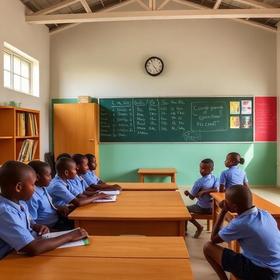If you live abroad and are thinking about sending your child to an American private school, you need to be aware of several things about American schools. If you are being transferred to the United States by your employer, your move will entail help finding and paying for private schools for your school-age children. Let's explore five characteristics of American private schools you need to know.
1. The U.S. has many private schools.
First of all, like everything else in the U.S., the number of private K-12 schools in the United States is overwhelming. There are over 29,000 private schools. See Private Schools: A Brief Portrait for an overview of the private school scene. Private schools educate approximately 10% of K-12 students.
This video gives you an idea of why Cabrini High School in New Orleans, Louisiana, is much loved by its students. Children attend American private schools by choice, not because they have to.
In North America, “public” refers to a school that receives funding from a government entity. The federal, state, and/or local authorities support our public schools with tax dollars. Generally, public schools are largely funded by property taxes at the local municipal level. Private schools, on the other hand, are generally supported almost exclusively by their own resources. These include tuition fees, fund-raising campaigns, and endowments. Private schools do not, as a rule, accept any form of state funding. To do so would jeopardize their independence. Another difference in nomenclature is the use of the word "college". College in North America generally denotes a tertiary or university-level institution. In Britain and Commonwealth countries college often denotes a private high school.
2. Freedom of choice is a cherished feature of private education.
Secondly, freedom of choice is at the heart of American private education. Many private schools were founded by groups of parents who want their children to be educated according to certain religious or educational principles. Christian, Jewish, Islamic, Seventh Day Adventist, Presbyterian, Baptist, Episcopalian, Roman Catholic, and Quaker schools are examples of some of the denominations that sponsor schools. Disciples of Maria Montessori and Rudolph Steiner have gone forth and multiplied. Montessori and Waldorf schools can be found in most communities.
Private schools subdivide along residential or boarding and non-residential or day school lines. You will find boarding schools for grades 9-12 and junior boarding schools for grades 7-9.
Watch students at Salisbury School, Salisbury, Connecticut, tell what is special about their boarding school.
Day schools are generally split into three broad categories: primary/elementary grades or PK-6, middle/junior grades or grades 6-9, and high school or grades 9-12 or 13. Grade 13 is what is known as a PG or post-graduate year. Many schools offer pre-kindergarten (PK) through grade 8 and then pass their graduates on to a high school that handles grades 9-12. These high schools, in the private school jargon, are known as prep schools or college preparatory schools.
3. A school for every need
All of these private schools come in various flavors to suit your needs. There are boys' schools, girls' schools, military schools, choir schools, alternative schools, special needs schools, sports schools, schools for the arts, and, fittingly, international schools. In short, if you can imagine a school, the American K-12 education industry probably has thought about it and can offer whatever kind of school you want.
Within these various categories, you will find multiple educational philosophies and teaching styles. That's why it is very important for you actually to visit the school if at all possible. Ensure that the school's way of doing things and what it teaches mesh with your requirements and expectations.
4. Finding the right school for your child
By now, you probably are wondering how to identify schools that will suit your particular needs. Start by determining how long you will be in the United States. If you plan to be in the States for just a few years, an international or British school is probably the best choice for your teenage children. British schools offer preparation for the British school leaving examinations. Slightly less in number are the French and German schools. They tend to be found in major metropolitan areas that attract substantial expat communities. Attending an international school that follows the curriculum your home country uses will make the transition back home much easier for your children.
A Royal Visit was an occasion to remember at the British School of Boston.
Another possibility is to enroll your children at a school that offers the International Baccalaureate program. The IB is accepted universally and is held in very high regard. If you have young children, you will have no trouble finding a good school as the options are wide and varied with uniformly high standards. Montessori schools can be found just about everywhere in the U.S., although you need to make sure that the school you are checking out is a genuine Montessori school. Waldorf and Reggio Emilia schools round out the early education offerings that are available.
5. Seeking expert advice.
The key to finding the right school for your child is to hire an educational consultant. American private schools are not ranked objectively by any regulatory authority. What constitutes a good school is a product of your expectations and requirements. For example, suppose your child has the potential to get into Harvard or Cambridge. In that case, you need to find a school with solid academics and a proven track record of placing its graduates in top-tier universities. If your son has a learning disability, there will be a school with experienced, highly-skilled faculty that can help him remediate that disability.
How do you determine which school meets your criteria? An educational consultant has the knowledge and experience you need to make sense of it all. This is the single most important recommendation I can make for any parent anywhere looking for a private school. Hire an educational consultant. It is money well spent.
What about last-minute transfers? Often, employers will give you little notice of an impending move. Can you get your child into an American private school after the academic year has begun? It depends on many things. Typically, private schools in areas that have a lot of comings and goings in the expatriate community will be more accommodating than those in areas where there are few expatriates. The other factor is whether or not the school has a place open. Students do withdraw during the academic year for all kinds of reasons. So it is just possible that there may be a place. This is yet another reason why you should engage an educational consultant. She will know what schools have places. If she doesn't know, she can find out that information very quickly.
Remember: finding the right school means a happy, successful child. Indeed, nothing is more important than your child's happiness.
Questions? Contact us on Facebook and Instagram. @privateschoolreview
#privateschools #overseasstudents












